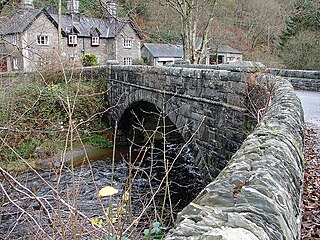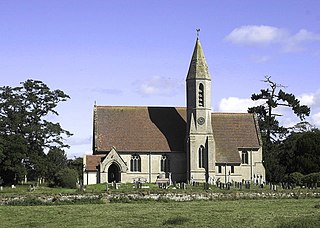
A potato chip or crisp is a thin slice of potato that has been deep fried, baked, or air fried until crunchy. They are commonly served as a snack, side dish, or appetizer. The basic chips are cooked and salted; additional varieties are manufactured using various flavorings and ingredients including herbs, spices, cheeses, other natural flavors, artificial flavors, and additives.
Consonant mutation is change in a consonant in a word according to its morphological or syntactic environment.
Welsh poetry refers to poetry of the Welsh people or nation. This includes poetry written in Welsh, poetry written in English by Welsh or Wales-based poets, poetry written in Wales in other languages or poetry by Welsh poets around the world.

The Darkness Beckons (ISBN 0-939748-32-0) is a book about the history of UK cave diving by Martyn Farr. It is considered the definitive work on the subject. Farr was a major figure in UK diving at a time when many of the original participants were still alive and available for interview. The first edition of the book was published in 1980. A second edition was published in 1991, followed by a substantially rewritten third edition on 3 July 2017.
Bookworm was a British humoristic comic strip, first published on 22 April 1978 in the magazine Whoopee! and survived Whoopee!'s merger with Whizzer and Chips in 1985, becoming a Chip-ite. It was drawn by Sid Burgon for most of its history, although Barry Glennard drew a substantial number of episodes.
The morphology of the Welsh language has many characteristics likely to be unfamiliar to speakers of English or continental European languages like French or German, but has much in common with the other modern Insular Celtic languages: Irish, Scottish Gaelic, Manx, Cornish, and Breton. Welsh is a moderately inflected language. Verbs inflect for person, number, tense, and mood, with affirmative, interrogative, and negative conjugations of some verbs. There is no case inflection in Modern Welsh.
Nicholas McGaughey is a Welsh television actor and voice actor best known for playing the character of Brandon Monk in the Welsh soap Pobol y Cwm. He has appeared on a number of top British television programmes such as Casualty in 1998. He also appeared as Praetorian Officer in the 2000 Hollywood blockbuster, Gladiator, among actors such as Russell Crowe and Oliver Reed. He also appeared in Sharpe's Gold in 1995 from the TV series Sharpe starring Sean Bean.

A full breakfast is a substantial cooked breakfast meal, often served in Great Britain and Ireland. The typical ingredients are bacon, sausages, eggs, black pudding, baked beans, tomatoes, mushrooms, toast, fried bread and a beverage such as coffee or tea. Hash browns are a common contemporary but non-traditional inclusion. Ingredients may extend beyond these or include regional variants, which may often be referred to by different names depending on the area. While it is colloquially known as a "fry-up" in most areas of the United Kingdom and Ireland, it is usually referred to as a "full English", a "full Irish", "full Scottish", "full Welsh", and "Ulster fry", in England, the Republic of Ireland, Scotland, Wales, and Northern Ireland, respectively.

The first Welsh-language comic was Ifor Owen's Hwyl which ran from 1949 to 1989.

MacBook is a brand of Mac notebook computers designed and marketed by Apple that use Apple's macOS operating system since 2006. The MacBook brand replaced the PowerBook and iBook brands during the Mac transition to Intel processors, announced in 2005. The current lineup consists of the MacBook Air (2008–present) and the MacBook Pro (2006–present). Two different lines simply named "MacBook" existed from 2006 to 2012 and 2015 to 2019. The MacBook brand was the "world's top-selling line of premium laptops" as of 2015.

Pen-y-garn is a small village in the Tirymynach district of Ceredigion, Wales, approximately 4 miles (6 km) north-east of Aberystwyth. Along with the hamlet of Rhydypennau, Pen-y-garn is now often considered to be part of the neighbouring larger village of Bow Street. All three places stretch in a long narrow strip along the main Aberystwyth to Machynlleth road (A487). As well as the houses on the main road from Cross Street up to Ysgol Rhydypennau, Pen-y-garn also includes the housing estates of Maes Ceiro, Bryn Meillion, Maes y Garn and Cae'r Odyn.

The Elected Member is a novel by Welsh writer Bernice Rubens. It won the Booker Prize for Fiction in 1970.
The phonology of Welsh is characterised by a number of sounds that do not occur in English and are rare in European languages, such as the voiceless alveolar lateral fricative and several voiceless sonorants, some of which result from consonant mutation. Stress usually falls on the penultimate syllable in polysyllabic words, while the word-final unstressed syllable receives a higher pitch than the stressed syllable.

Pont-rhyd-y-groes is a village near Cwm Ystwyth and Pont ar Fynach, in Ceredigion, Wales. The village takes its name from the bridge and (earlier) ford over the River Ystwyth.

Brut y Brenhinedd is a collection of variant Middle Welsh versions of Geoffrey of Monmouth's Latin Historia Regum Britanniae. About 60 versions survive, with the earliest dating to the mid-13th century. Adaptations of Geoffrey's Historia were extremely popular throughout Western Europe during the Middle Ages, but the Brut proved especially influential in medieval Wales, where it was largely regarded as an accurate account of the early history of the Celtic Britons.
Hywel ap Syr Mathew was a Welsh poet, genealogist and soldier.
Lying to Be Perfect is a made-for-television movie from Lifetime based on the novel The Cinderella Pact by Sarah Strohmeyer.

The Children is a 1990 British–German drama film directed by Tony Palmer and starring Ben Kingsley, Kim Novak and Britt Ekland. It is based on the 1928 novel by Edith Wharton.

Joker was a British comic strip. It first appeared in Knockout issue 1 on 12 June 1971. Knockout merged with Whizzer and Chips in 1973. Joker stayed in Whizzer and Chips as a Whizz-kid until the end, when he continued in Buster until the close of the comic on 4 January 2000. On the "last page" of Buster, Joker reveals that he was Jeremy Beadle all along. The strip was written by Malcolm Morrison, and illustrated by Sid Burgon.

Bettisfield is a village of about 150 dwellings in Wrexham County Borough, Wales and stands on the Wales-England border, and in the community of Maelor South. It lies south of the Llangollen Canal on the border with Shropshire, England within the historic English Maelor region which was formerly part of the historic county of Flintshire. The village lies close to Fenn's, Whixall and Bettisfield Mosses, an area of peat bog which was declared a national nature reserve in 1996 because of its importance for wildlife. The English market towns of Whitchurch, Ellesmere and Wem each lie about 6 miles distant to the northeast, west and southeast respectively.












